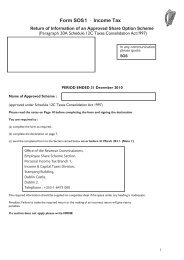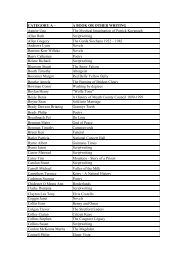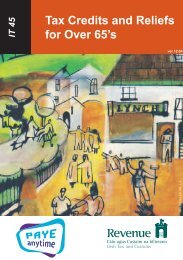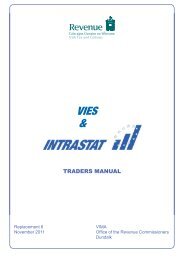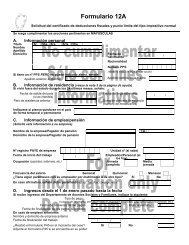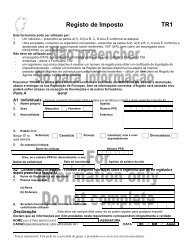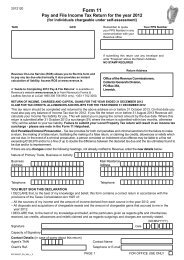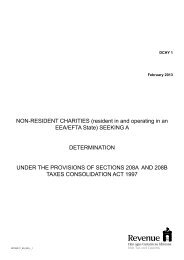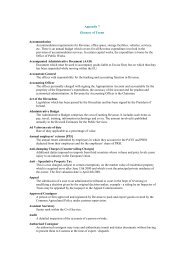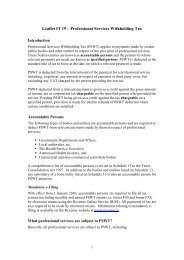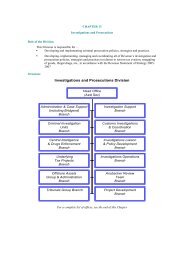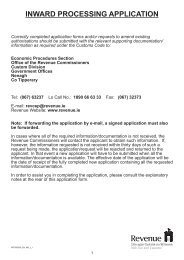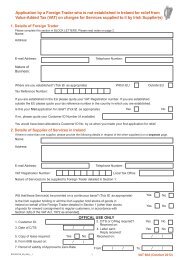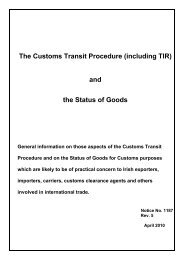Notice No. 1877 - Excise - Revenue Commissioners
Notice No. 1877 - Excise - Revenue Commissioners
Notice No. 1877 - Excise - Revenue Commissioners
Create successful ePaper yourself
Turn your PDF publications into a flip-book with our unique Google optimized e-Paper software.
These economic operators must interface with <strong>Revenue</strong> using open market web services. For<br />
this purpose, <strong>Revenue</strong> utilises the same IT interface strategy as the Customs Automated Entry<br />
System (AEP). Communications between traders and the <strong>Revenue</strong> EMCS application will be<br />
through the <strong>Revenue</strong> On-line System (ROS).<br />
To interact correctly with EMCS, traders must ensure that they have the appropriate<br />
registration with ROS. Further information can be found in the EMCS ROS User Guide<br />
available on the <strong>Revenue</strong> website via the following link:<br />
http://www.revenue.ie/en/tax/excise/emcs/emcs-ros-user-guide.doc<br />
9 Opening Hours<br />
The opening hours of the warehouse are at the warehousekeeper’s discretion. Appropriate<br />
security arrangements, Health and Safety and management systems must be in operation<br />
during these hours.<br />
10 Requirements in Respect of Records<br />
All records relating to excisable goods must be kept for a period of six years, or such lesser<br />
period as may be advised by <strong>Revenue</strong>. The warehousekeeper’s records should incorporate<br />
clear audit trails.<br />
These records, including returns and accounts of any authorised warehousekeepers who are<br />
tenants of the tax warehouse concerned, must be made available to <strong>Revenue</strong> on request. The<br />
records must be kept either at the registered place of business, or tax warehouse of the<br />
warehousekeeper, or at such other place as <strong>Revenue</strong> may allow.<br />
Great importance is attached to the standard of stock control and management in warehouses.<br />
Stock records are required for all alcohol products produced in, received into, held in and<br />
delivered from the tax warehouse. A stock account is required under Regulation 24 of the<br />
Alcohol Products Tax Regulations 2004 (S.I. <strong>No</strong>. 379 of 2004), and Schedule 3 to those<br />
Regulations specifies other records that are required to be kept.<br />
Upon application to <strong>Revenue</strong>, a warehousekeeper may be authorised to produce records in a<br />
particular format, or, for example, on company stationary. Official requirements in this regard<br />
are set out in Regulation 21 of the Alcohol Products Tax Regulations 2004 (S.I. <strong>No</strong>. 379 of<br />
2004).<br />
While the precise format of these records may vary, stock accounts must contain all the<br />
information needed for <strong>Revenue</strong> purposes. Appendix 1 sets out general requirements, which<br />
are in line with good commercial practice. If for any reason, location-based details cannot be<br />
provided in the stock account, this may be allowed, on application to <strong>Revenue</strong>, provided that<br />
all goods in warehouse can be produced on demand.<br />
9



